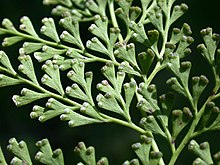Odontosoria chinensis
| Odontosoria chinensis | |
|---|---|

| |

| |
| Scientific classification | |
| Kingdom: | Plantae |
| Clade: | Tracheophytes |
| Division: | Polypodiophyta |
| Class: | Polypodiopsida |
| Order: | Polypodiales |
| Family: | Lindsaeaceae |
| Genus: | Odontosoria |
| Species: | O. chinensis
|
| Binomial name | |
| Odontosoria chinensis (L.) J.Sm.[1]
| |
| Synonyms[1] | |
| |
Odontosoria chinensis is a fern in the family Lindsaeaceae.[1][2] Commonly called lace fern (Hawaiian: pala'ā, palae, or palapala'ā), it is native from India to Hawai'i, and south to Sumatra, Borneo and the Philippines, as well as other parts of the tropics and sub-tropics.[1] It is commonly found in forest openings and disturbed areas such as landslides, along trails or roads. It grows in moist, shady areas from sea level to an elevation of 4,000 feet.[3]
Subspecies
[edit]As of November 2019[update], two subspecies were recognized:[1][2]
- Odontosoria chinensis ssp. chinensis
- Odontosoria chinensis ssp. tenuifolia (Lam.) Fraser-Jenk. & Kandel
Odontosoria biflora from the Philippines has also been treated as a subspecies of this species.
Uses
[edit]Hawaiians made red-brown dye from the old fronds. Pala'ā was used to treat "female ailments". It is made into a lei using the hili, or hilo technique - a braiding or plaiting method with only one type of plant material. It is also made into haku with other plants using the wili or winding method and a backing.[4]
See also
[edit]References
[edit]- ^ a b c d e "Odontosoria chinensis (L.) J.Sm". Plants of the World Online. Royal Botanic Gardens, Kew. Retrieved 2019-11-19.
- ^ a b Hassler, Michael & Schmitt, Bernd (November 2019). "Odontosoria chinensis". Checklist of Ferns and Lycophytes of the World. 8.11. Retrieved 2019-11-19.
- ^ Growing plants for Hawaiian lei : 85 plants for gardens, conservation, and business. Honolulu: College of Tropical Agriculture and Human Resources, University of Hawaiʻi at Mānoa. 2002. pp. 38–39. ISBN 1929325134.
- ^ Bornhorst, Heidi Leianuenue (2005). Growing native Hawaiian plants : a how-to guide for the gardener. Honolulu: Bess Press. p. 63. ISBN 1573062073.
External links
[edit] Media related to Sphenomeris chinensis at Wikimedia Commons
Media related to Sphenomeris chinensis at Wikimedia Commons- Plants for Hawaiian Lei: Pala'ā (accessed September 25, 2015)
